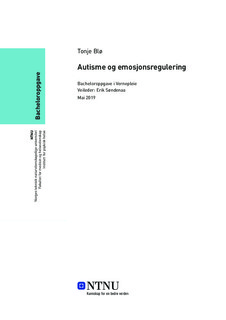| dc.contributor.advisor | Søndenaa, Erik | |
| dc.contributor.author | Blø, Tonje | |
| dc.date.accessioned | 2019-08-24T14:02:34Z | |
| dc.date.available | 2019-08-24T14:02:34Z | |
| dc.date.issued | 2019 | |
| dc.identifier.uri | http://hdl.handle.net/11250/2610649 | |
| dc.description.abstract | Sammendrag
Bakgrunn: I menneskelig fungering og utvikling er emosjonsregulering et grunnfenomen. Personer med autisme har vansker med å uttrykke, identifisere og kontrollere egne følelser, samt å forstå tanker og følelser andre har. De har ofte vansker med å forstå andre mennesker og hvilke signaler de gir, og ens egne reaksjoner og følelser. Å ha utfordringer i sosiale samhandlinger er et fellestrekk ved personer med ASD, samt problemer med å forstå sosiale regler i samfunnet.
Hensikt: Hensikten med denne studien er å finne ut hva litteraturen sier om hvilken betydning emosjonsregulering og sosial fungering har hos personer med autisme.
Metode: Denne studien er en litteraturstudie. Det har blitt gjennomført strukturerte søk etter vitenskapelige forskningsartikler som belyser tema og problemstillingen. I denne studien ble fem artikler inkludert.
Resultater: Basert på de fem artiklene inkludert i denne studien ble resultatene presentert i tre tema; emosjonsregulering, reguleringsstrategier og sosial fungering hos personer med autismespekterdiagnose.
Konklusjon: Emosjonsregulering er et pågående problem for personer med ASD. Det kan vises til en sammenheng mellom ASD-symptomer og emosjonsregulering. Flere strategier for å regulere emosjoner blir brukt hos autister. Noen er mer hensiktsmessig enn andre og skaper færre utfordringer og mer positive følelser enn negative. De har mangelfull sosial fungering, og problemer med å holde i gang samtaler. Jo bedre emosjonsregulering de har, jo mindre utfordringer på sosiale områder. | |
| dc.description.abstract | Abstract
Background: Emotion regulation is a core phenomenon in human functioning and development. Individuals with autism have deficits expressing, identifying and controlling their own emotions, and to understand others’ thoughts and emotion. They often have trouble understanding other people and the signals they are giving, and also their own feelings and their reactions to these feelings. Social impairment is a core feature in ASD, and also to understand social rules in the society.
Aim: The aim of this study was to find out what current literature say about the significance emotion regulation and social functioning has for people with autism.
Results: The results are presented in three themes, based on the five articles included in this study. The themes presented there are emotion regulation, regulation strategies and social functioning in people with autism spectrum disorder.
Conclusion: Emotion regulation is an ongoing problem for people with ASD. It has been found a connection between ASD-symptomatology and emotion regulation. People with autism use many different strategies to regulate their emotions, some more appropriate than others, and they will create fewer challenges and more positive emotions. They lack social functioning, and they also have problems continuing conversations. The better their emotion regulation is, they will have less social impairment. | |
| dc.language | nob | |
| dc.publisher | NTNU | |
| dc.title | Autisme og emosjonsregulering | |
| dc.type | Bachelor thesis | |
